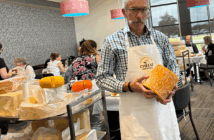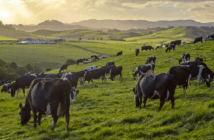
One of New Zealand’s largest producers of Asian fusion foods is fielding export opportunities following a post-pandemic surge in international demand for its vegan and ‘free-from’ products.
A new collaboration with TV chef Rewi Spraggon will also see the company launch a hangi-cooked pork steamed bun into local supermarkets – blending traditional Chinese and Maori cooking styles together in an industry first.
Old Country Food supplies over 20 million frozen dumplings, steamed buns and bao buns annually to supermarkets and restaurants around New Zealand – including vegan and nut-free, MSG and preservative free products.
The company is growing by 20% annually following a period of rapid expansion during the past six years which saw revenue increase from $600,000 to more than $5 million.
Dr Amy Sevao, Old Country Food CEO, says historically the firm was focused on serving the Asian supermarket niche where they have built up a dominant market share, but have since expanded into mainstream supermarkets and the food service channel – as well as larger, independent restaurants.
“What we have seen in recent years has been a growing local interest in Asian fusion foods – which have now become normalised within the diets of many Kiwi households.
“Nationally, the category has grown by around 30-40% over the past year and our sales have responded positively to this trend.
“Our reputation for innovation has also led to international interest from Australian companies looking at our vegan and nut-free products and asking if we can develop bespoke products and flavours for their customer base.
“We’re in discussions with a number of retailers which we can potentially supply as part of our trans-Tasman export expansion strategy,” she says.
Sevao, who previously worked in clinical medicine and research, now runs the family’s Auckland food manufacturing business.
“The company has been owned by various Asian migrant families since it began over 35 years ago.
“Each family has introduced the flavours of their own region into the product range.
“My family has focussed on the development of innovative new products like the nut-free chicken satay and hangi steamed buns, as well as refining the range,” she says.
Sevao says the company’s sustainability journey has seen the transition to entirely recyclable or compostable packaging.
“After a three-year research project looking for more responsible alternatives to polystyrene, we have changed the material which makes up the trays inside our packaging to a sugarcane fibre product.
“The tray is an effective substitute for plastic with a much smaller environmental impact.
“In recent years we also have seen the impact of global warming on the frequency of typhoons in the South China Sea, which is a key international shipping channel for New Zealand.
“With climate change impacting the stability of our supply chains, our procurement team began an exercise to source all our ingredients locally.
“The project parameters they were given included ensuring all our suppliers were within driving distance of our factory, so that in the event of a major disruption we could simply get in our trucks and pick them up if we needed to.
“Our local procurement practice, which covered all fresh ingredients used in our manufacturing process, was already in place before the pandemic.
“Covid-19 subsequently brought with it further impact to global supply channels and our prescient efforts to reduce the food miles of our raw materials and mitigate the risk of supply disruption have translated into a growth in wholesale customer numbers – many of whom were experiencing delays of six months or more from their existing suppliers,” she says.
Sevao says their new venture with Rewi Spraggon, also known as the Hangi Master and star of TV show Maori Kai, came from a referral by a local consultant chef who helped develop the new hangi-cooked pork steamed bun flavour.
Spraggon who operates New Zealand’s only MPI approved hangi from his West Auckland facility says the intercultural collaboration is designed to help introduce flavours of traditional Maori cooking techniques to urban consumers who may otherwise not be able to access foods prepared in a hangi.
He says the meat in the pork hangi bun is cooked using heated rocks which have been handed down through generations of his family.
“We know that for many people in Aotearoa as well as manuhiri – those who are new to the country, the opportunity to experience the versatility of ancient Maori food preparation methods may not always be easy.
“What we have developed as part of our collaboration is an easy to access and consume portable food format – which provides the opportunity for many to try traditional hangi flavours for the first time,” he says.
Sevao says the company launched a direct-to-consumer ecommerce channel during the first lockdown which now makes up around 5% of their total sales.
“We developed the digital sales channel in less than a week and our in-house delivery team allowed us to ship products directly to residential addresses in Auckland.
“If a residential frozen delivery service was available outside of this region, we would expect significant further growth through this channel,” she says.




























































































